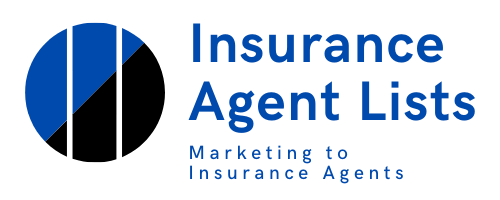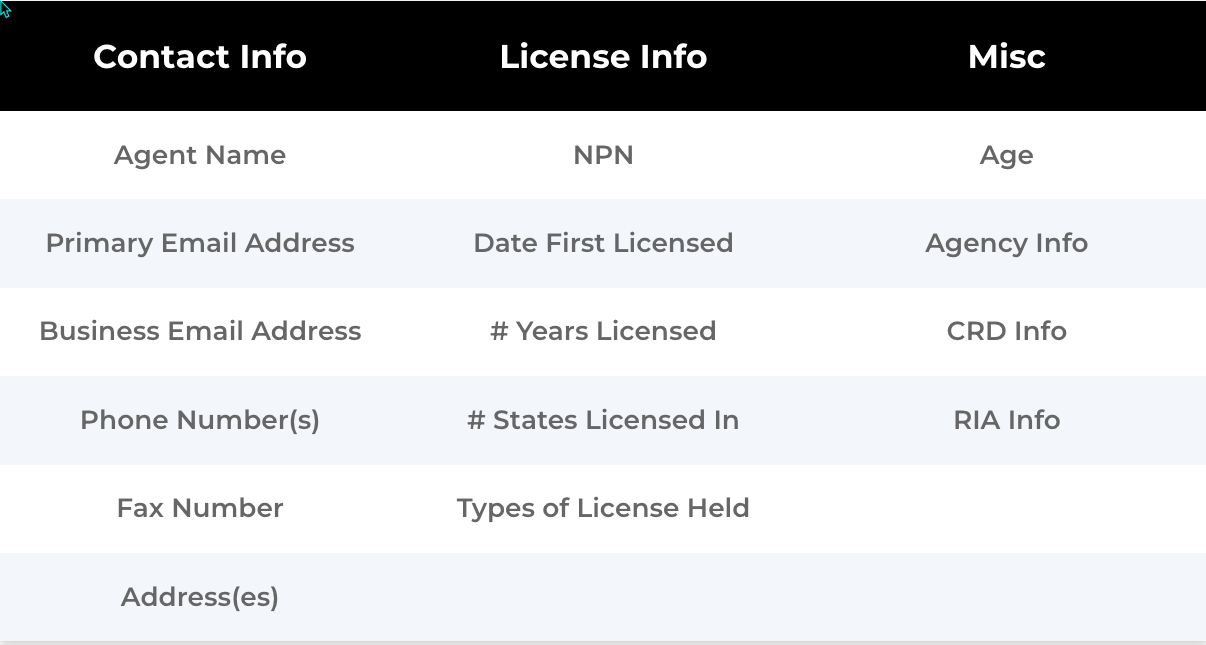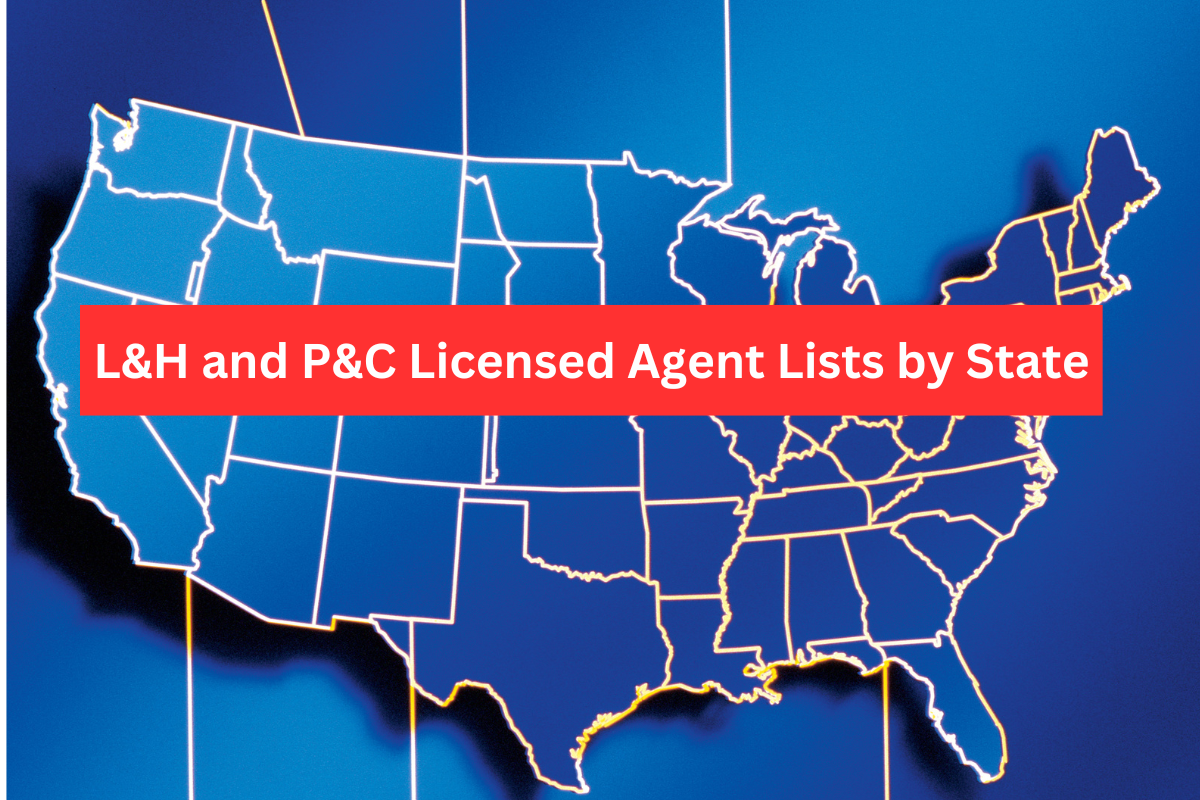- Safe Payments
- Immediate Downloads
- Verified Emails
- Current Sale

The Data Edge In Insurance Agent Recruitment
- BLOG Written and Edited By: Matt McCray
Introduction
In the insurance world, finding the right people to work as agents is super important but also pretty tough. Nowadays, the way we find and hire these insurance agents is changing a lot because of something called data. Before, people used old-school ways to find new agents, but now, using licensed insurance agent data helps a lot. It's like having a secret weapon that makes finding and hiring the best agents easier and better.

When we use data in hiring, it's like having a superpower. It helps us quickly find the people who are just right for the job, talk to them in a way that they like, and even figure out who will stay with us for a long time. By using data, we can make sure we’re picking the best people, saving time, and keeping our new hires happy for longer.
So, what's this all about? We're going to take a closer look at how using data can make finding new insurance agents a lot easier and smarter. We'll see how it's changing the game in hiring and helping agencies like ours stay on top. Let's dive in and learn how data can help us not just fill jobs, but make our agency stronger with the best people around.
Understanding the Data Landscape
Venturing into agent recruitment, I saw data's more than numbers. It's a goldmine of insights waiting to be found.There are so many types of data that can help me find the perfect insurance agent. It covers their residence, job background, license types, and more.
This data comes from various sources: Department Of Insurance websites, public records, and hidden ones. I learned quickly that not all data is created equal. I have to be really careful to use data that's not just accurate but also respects people's privacy and follows the law. It's a bit like being a detective, making sure I'm collecting clues that are not only helpful but also legal and fair to use.
Here's a bit more about what I've learned:
- Demographic Information: Understanding agents' location and background is beneficial for me. It means I can find people who fit well with what my agency needs, like someone local or someone with a specific kind of experience.
- Work History: I review agents' past work and achievements to see if they are right for me. It's like seeing their track record before I decide to bring them onto my team. This takes place on Linkedin.
- Licensing Details: In insurance, being licensed is a big deal. I use data to see who's licensed to do what. This way, I make sure I'm talking to the right people for the right job.
- Performance Metrics: This is all about how well they've done in their careers. Have they been top sellers? Do they keep their customers happy? This info helps me pick stars who can shine at my agency.
In this digital age, being savvy with data has changed everything for me. I'm not just looking for anyone; I'm looking for the right someone. With all this data, I can find top agents efficiently. They'll excel in their roles and help my agency grow.
Data-Driven Recruitment Strategies
After understanding available data, I revamped hiring of insurance agents. Piecing data together is like solving a puzzle. It clarifies the bigger picture for me. Here’s how I put those pieces together:
- Identifying Ideal Candidates: First off, I dove into the data to figure out what traits my top-performing agents had in common. Were they from a certain area? Did they have specific kinds of experience? This wasn’t about gut feelings; it was about finding patterns in the data that could guide me to similar candidates. It was like having a map to hidden treasure, showing me where to find these potential star agents.
- Tailored Outreach Efforts: I learned that not all agents respond to the same types of messages or recruitment efforts. Some preferred a personal phone call, while others responded better to an email detailing the opportunities. Using data to segment my audience, I can personalize my outreach. This makes interactions more effective and personal. It was a game-changer, making my messages more like a welcome handshake than a cold call.
- Competitive Intelligence: The data also gave me insights into what other companies were offering. I could see trends in benefits, salary ranges, and other perks. This allowed me to craft offers that were not only competitive but also highlighted what made working with my agency unique. It was like knowing exactly what to say to make someone feel seen and valued, giving me an edge in attracting top talent.
Implementing these strategies wasn’t overnight magic. It required patience, testing, and learning from each interaction. But as I fine-tuned my approach, I started to see better results. My messages got more replies, my interviews were more fruitful, and the agents I hired were closer to the ideal fit I had envisioned. Speaking the language of data connected me with potential agents.
Using data for recruiting boosts efficiency and enhances insights. It's a journey of continuous learning, improving hiring decisions and team strength.

Enhancing the Recruitment Process with Data
With new strategies in mind, I focused on refining recruitment. Using gathered insights, I aimed to enhance every step efficiently. Here’s how I made it happen:
- Streamlining Candidate Screening: Sifting through applications was like finding a needle in a haystack. Using automated screening tools helped me find ideal candidates fast. This wasn’t about cutting corners; it was about efficiency. It meant I could spend more time with candidates who were more likely to be a great fit, turning a daunting task into a manageable one.
- Predictive Analytics for Fit and Retention: I started looking into predictive analytics. It might sound complicated, but it's about using data. I predict which candidates will succeed and stay longer. By studying past hiring outcomes, I can evaluate future candidates. It was like having a crystal ball, giving me insights into how well someone might fit with our team and our goals before making a hiring decision.
- Continuous Improvement: Perhaps the most transformative aspect was adopting a mindset of continuous improvement. Every hire, every interaction became data for learning and refining my approach. I monitored outreach, interviews, and onboarding to enhance effectiveness. Constantly evolving, my recruitment process became more tailored and effective.
These upgrades improved my recruitment efficiency and added a personal touch. Using data allows me to prioritize human connections. It helps build relationships with candidates and make informed decisions. This benefits both them and my agency. It was a far cry from the impersonal, numbers-driven image that 'data-driven' might suggest. In reality, it brought me closer to my candidates, ensuring that when I made a hire, it was the right choice for everyone involved.
Implementing these data-driven enhancements in my recruitment process has been a game-changer. I've noticed better success with my hires lately. Candidates' quality has greatly improved.It’s a testament to the power of data not just to inform, but to transform.
Success Stories
Transitioning to a data-driven recruitment process changed my work. It aimed for better outcomes. Two success stories stand out. Data insights made them possible.

- The Unexpected Perfect Fit: There was one candidate who, on paper, didn’t have the typical background I’d look for in an insurance agent. But the data suggested a deeper look was warranted, indicating a match with the traits of my top performers. Trusting the data, I moved forward with the interview and was amazed. This individual added a new outlook and energy to our team. They excelled fast, becoming a top agent in months. It taught me to trust data over conventional wisdom.
- Streamlining for Success: Another significant win was the overall reduction in the time it took to fill open positions. By streamlining the screening process and focusing my efforts where the data pointed, I cut the average time-to-hire by nearly 30%. This saved time, helped us seize opportunities, avoiding losing top candidates. It was a clear win, boosting our agility and edge.
These stories are just the tip of the iceberg. Each hire, each success story built my confidence in a data-driven approach. They showed the importance of each data piece. It's not just for hiring but also for agency growth. Using data improves hiring and team resilience.
Implementing Data-Driven Recruitment in Your Agency

Adopting a data-driven approach to recruitment wasn’t an overnight shift. It required careful planning, a bit of trial and error, and a commitment to learning from each step of the process. Here’s how I made it work for my agency, and how you can too:
- Start Small and Scale:I first identified a part of the recruitment process. It might benefit from using data. For me, it was the initial screening of applicants. By focusing on this single step, I could measure the impact more clearly and make adjustments without overwhelming myself or my team.
- Choose the Right Tools: Many tools can assist with data-driven recruitment. They range from analytics platforms to applicant tracking systems. I spent time researching and experimenting with a few before settling on the ones that best fit our needs and budget. Finding tools with needed functions and easy adoption was crucial.
- Educate and Involve the Team: Introducing a new method needed everyone in recruitment to agree. I held sessions to explain the benefits of a data-driven approach, how it would work, and the role each team member would play. Encouraging openness to change and fostering a culture of continuous improvement were key to our success.
- Monitor, Analyze, and Adjust: With every new hire, we gathered data to see how well our strategies were working. We aimed to evaluate our hiring decision and identify the process's strengths and weaknesses. Regular reviews helped us adjust our strategy. This made our recruitment more efficient and successful.
- Celebrate the Wins: It was important to acknowledge even small successes. This action maintained momentum and kept the team motivated. Whether we made a great hire or got good feedback from a new agent, celebrating these wins reminds us of the value of our data-driven approach.
Implementing data-driven recruitment has been a journey of transformation for my agency. It’s reshaped not just how we hire but also how we think about growth and success. The lessons from each new hire are priceless. They help us fill roles and understand team dynamics. Also, they guide us in evolving to tackle insurance industry challenges.
Conclusion
Embracing data-driven recruitment has been a transformative journey for me and my agency. It wasn’t just about adopting new tools or tweaking processes; it was about changing our mindset towards growth and recruitment. We use data to find the best candidates and learn what makes our team succeed. This method showed me data's power in decision-making. It cuts guesswork, strengthens teams. It's helped us hire strategically, focusing on effective efforts. Engaging candidates personally for better connections and results.
But perhaps the most valuable lesson has been about the potential for continuous improvement. With every new hire, we collect data. This data helps us enhance our process, refine our strategies, and grasp the changing insurance industry. It’s a cycle of learning and growth that benefits not just our agency but also the candidates we engage with.
Call to Action
If you’re on the fence about incorporating data into your recruitment process, I encourage you to take the leap. Start small, as I did, and you’ll soon see how even a bit of data can make a big difference. Improving your screening process, tailoring outreach, understanding your team—it's crucial! Insights from a data-driven approach are truly invaluable.
Remember, the goal isn’t just to fill positions but to build a team that’s robust, dynamic, and aligned with your agency’s vision for the future. With data as your guide, you’re not just recruiting; you’re strategically building the foundation for your agency’s success.
Buy Licensed Insurance Agent Data Here
I’d love to hear from others who are navigating the world of data-driven recruitment. What challenges have you faced? What successes have you celebrated? Sharing our stories and lessons can only make us stronger, as professionals and as an industry.
Let’s embrace the power of data together and see just how far it can take us.
Discounts available on bulk purchases of insurance agent lists!
Once you have checked out in our online store, you can immediately download your insurance agent list. For bulk discounted purchases, make sure to use the appropriate coupon code!
Please Note ALL Sales of Data and Services are Final
All Sales of Insurance Agent Data Lists and Services are Final, we DO NOT offer Refunds on delivered data or services.
All Rights Reserved | Insurance Agent Lists | Website Designed by AgencyBuilderPro
